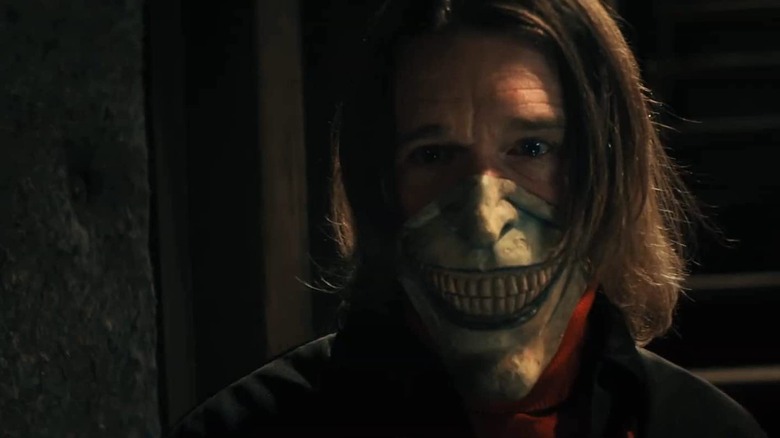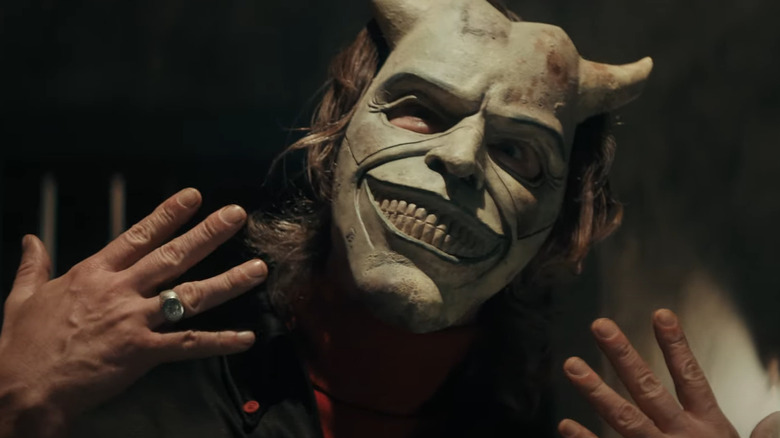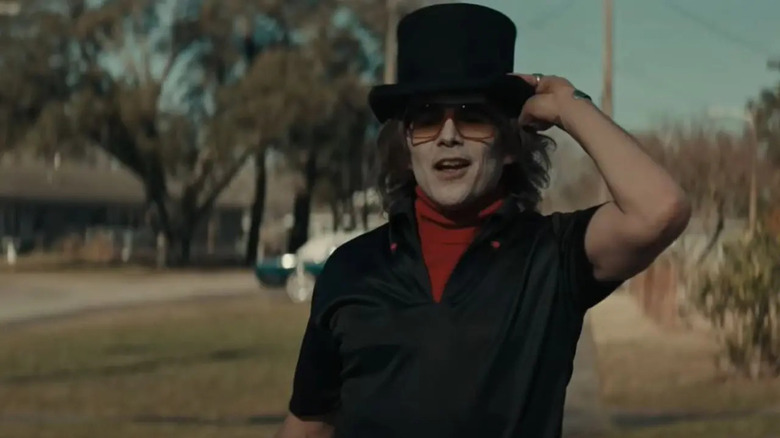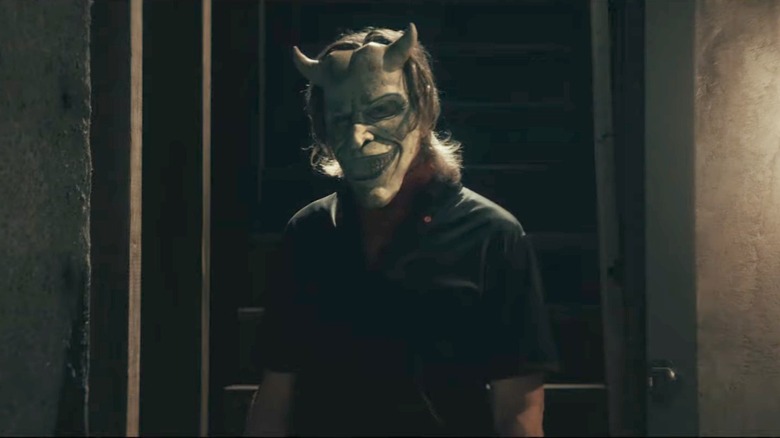
You don't see too much of Ethan Hawke in "The Black Phone," and that's by design. In Scott Derrickson's new horror movie, the Oscar-nominated actor plays The Grabber, a mysterious abductor and killer of children who hides his identity with a gruesome mask, one that he seems very proud to wear. And with only his eyes and his voice, Hawke leaves an impression. This is a horror villain who exists in the space between the real and the unreal, a grounded monster who feels like he walked out of our own world but still wouldn't feel out of place in a fable. He's not straight out of "Grimms' Fairy Tales" as much as he is the thing those stories were written to warn kids about in the first place.
Hawke has been having one heck of a year, with standout performances in Marvel's "Moon Knight" and Robert Eggers' "The Northman" preceding his first go at playing a horror villain. Between "The Black Phone" and Hawke's previous collaboration with Derrickson, the terrifying modern classic "Sinister," we can only hope that these two continue to work together for the foreseeable future.
I recently sat down with Hawke to talk about "The Black Phone," treating child co-stars with respect, not doing too much research to play a monster, and how making great horror is like solving a math problem.
'Making A Good Horror Film Is A Lot Like Solving A Geometry Problem'

I saw the movie at a Fantastic Fest last year and it stuck with me. It's really good.
Oh great. I'm glad. I wish I could have been at Fantastic Fest. That sounded like a fun night.
This is your second time working with Scott Derrickson. What do you find compelling about him as a filmmaker?
Well, Scott is in love with cinema and all the best directors that I've worked with -- when I was a young kid, I worked with Joe Dante, who was kind of a master of the grindhouse, Roger Corman horror pic. He taught me a lot about how beautiful genre movies can be and how special they can be. When I did "Sinister" with Scott, he kind of reawakened that passion in me. I loved acting for him. My character in "Sinister" was a really interesting challenge for me as a performer. I like the way he thinks about movies. I like being in front of his camera because he's just in love with it.
Making a good horror film is a lot like solving a geometry problem. There's a math to building it. It has to be simple enough, complicated enough. People write books about Hitchcock and the timing and the way the cuts work. There's just a math to it. Scott's a very elegant filmmaker, and I feel like this script was even better than "Sinister," and it's more mature filmmaking. He makes good movies. If you love acting, you want to be with serious filmmakers because it gives you a shot.
Most of your scenes in this movie are with a younger actor. I'm curious about how you approach these scenes, where you need to essentially terrorize a kid. As a collaborator, what kind of environment do you create as the veteran actor in that scenario?
Well, you want to create a sense of play and make it very obvious that we're doing an imaginative exercise, and kids are really good at that. Kids love Halloween. Kids aren't afraid of pretending to be scared. All of us suffer a tremendous amount of anxiety. One of the things that I think is wonderful about horror movies is they kind of teach us a way to deal with fear and anxiety and give a place for it and show us that we can manage it. I don't know. I enjoyed this young person. I was 14 when I started acting, so I empathize with the kid. Mostly they just like to be taken seriously, treated with respect.
'It's Like A Feel-Good, Scary Movie. I've Never Heard Of Such A Thing'

In the past you've spoken about like the kind of research and preparation you do for roles and how much thought you put in into them. I'm curious about the preparation for a character like this, who is very intentionally left a mystery. What did you draw from to build him as a presence?
Well, every job has its own weird challenges. This job, there's something theatrical about this. There's something about The Grabber. He seems to be performing for the kid. The mask is some elaborate performance of his. The way that Scott designed it with these nine different masks, each one revealing a different aspect, it felt like I was playing a game of hide and seek with the audience, with Finn.
In a way, this film is a kind of classic coming of age story. It's not a portrait of madness or a portrait of The Grabber. We only see The Grabber the way this 14-year-old kid sees him. I felt that there was more power in the mystery of him. I loved that the screenplay didn't over-explain it. To be honest, I didn't really want to become Jeffrey Dahmer for this or any film. I love the wit of the movie and I tried to kind of just dance with that.
The trailer for this movie sells it as a scary movie, and it is scary, but I keep telling people, "No, it's really fun, it's actually a crowd-pleaser. People want to cheer this kid on and see him escape. There's a real fairy tale element to it." Do you agree with that?
It's really why I did the movie. When Scott called me up and told me he wanted me to play The Grabber, this person who abducts kids, I was like, "Listen, I'll read it, but there's no way I'm going to play that part." Then when I read the script, I was like, "Oh wow, this is more like 'Stand By Me' than it is a slasher pic." I said to him I've almost never come across something that is so scary that feels like it has a heart of gold. It's like a feel-good, scary movie. I've never heard of such a thing. It felt like it hits an original tone.
I feel like Joe Hill [the author of the short story that inspired the film], like some of the best horror writers, is an optimist at heart. As dark as "Sinister" is, I think that Scott Derrickson also understands that sometimes we need to escape the terror and not just indulge it.
Yeah, and you know that you create three dimensional storytelling with shadow and light. If it's too much shadow and too much light, you got a Hallmark card, right? Too much darkness and you don't feel anything for the characters, because that's not the way the world is. The world isn't only one thing. I think there's an aspect of this movie that has a kind of, I don't know ... Stephen King, Spielberg, there's a feeling. It walks a strange tone where it's crossing genres in a way that has a lot of heart to it.
'I Change Myself As An Actor By Working Inside Different Genres'

I know that Scott Derrickson has spoken about his faith before. It's a recurring theme in all his movies, whether he's making a Marvel movie or a small horror film: He makes stories about people's faith being tested. I feel like this movie continues that trend. Are you interested in that kind of storytelling as well?
I really am. I think it's what elevates Scott's work, is he sees it in a larger context about why we were born and where we go when we die and what are we here to do. He sees everything. I mean, I found "Doctor Strange" a strangely spiritual film. Maybe strange is the wrong word -- a uniquely spiritual film. It's not just in the supernatural aspects. It's in the crisis of the self in personal faith. One of the things you could talk ... "Sinister" is kind of his most nihilistic film, but it's because the main character gives into his own ego and doesn't see himself in the larger context of humanity with that level of humility that saves people. One of the things that I think's beautiful about "Black Phone" is these people who were victims are now benevolent ghosts and have agency in their afterlife to heal something that was wrong. There's something beautiful about that.
I've seen you in three projects recently: "The Black Phone," "Moon Knight," and "The Northman." I'm curious about how your process as an actor changes when you approach such different roles. Do you always have to rethink it?
I heard Willem Dafoe say this once and I thought, "Wow, he just said it!" You read scripts sometimes and you see a space where maybe you could contribute. When I see that space, I want to do it. Now, my preparation for "The Northman" is completely different than [for] The Grabber. The work that it takes to do "Moon Knight" is completely different than the other two. There was space in each one of them for me to be a part of it, I felt like. Does it matter who plays this part? Can the actor contribute? It's strange. I almost feel like a different actor in all three of them because what's being asked of me is so different.
If you do something like "First Reformed," that's an interior performance, whereas "The Black Phone" is kind of an exterior performance. It's in your face. It's going out. It's not going in. "The Northman" is kind of like a poem. It felt more like doing Shakespeare than it did ... I mean, the language is not naturalistic. The costumes are a part of the character, the world-building. Then making a scary story's a totally different engine. It's the real fun of my life, is getting to do all these different kinds of movies. I change myself as an actor by working inside different genres.
"The Black Phone" hits theaters on June 24, 2022.
Read this next: The Saddest Character Deaths In Horror History
The post The Black Phone Star Ethan Hawke Wanted to Play Hide and Seek With the Audience [Interview] appeared first on /Film.
0 Comments